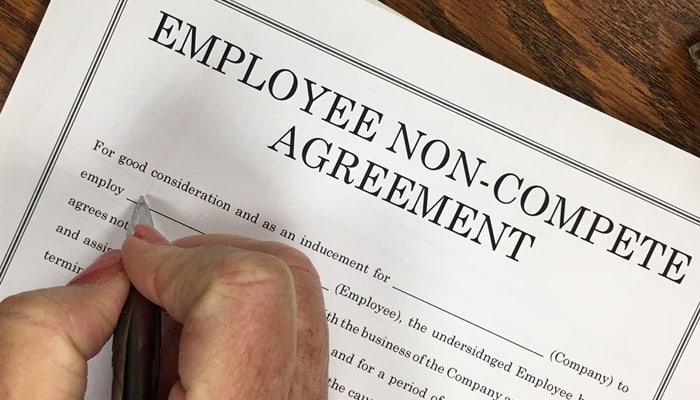
When you joined your current employer, were you asked to sign a non-competition or non-solicitation clause?
Many employees in Calgary would not remember whether this is the case is not – but it’s important as it may affect what you are legally entitled to do if and when you leave your current position.
Some employees are surprised to find out that there are options are restricted after they leave their job. They cannot do as planned because they signed employment contracts that included strict terms of employment and various clauses about what happens when they leave.
A non-competition clause, for instance, prevents an employee from pursuing similar employment with a competitor or starting their own business in direct competition with the employer during and after employment.
But how enforceable are non-competition clauses and what rules must they follow to stand up in the courts?
NON-COMPETITION CLAUSES VS NON-SOLICITATION CLAUSES
You already know what a non-competition clause is. It prevents an employee from moving to a direct competitor or setting up in business in direct competition with the employer for a defined period.
How does a non-solicitation clause differ from this?
This is a clause used by employers to protect against losing staff or customers to an employee who leaves the company.
It effectively prevents the departing employee from approaching the clients or employees of their former employer to move over to their company. It may also include a restriction on seeking to hire suppliers of the business.
Non-solicitation agreements may also be standalone agreements rather than clauses within employment contracts. Generally speaking, they are less restrictive and easier to enforce than non-competition clauses.
WHAT SHOULD NON-COMPETITION CLAUSES INCLUDE?
In Canada, employees have the freedom to pursue the careers they want and to work for the employers of their choice. The courts have no interest in depriving hard-working Canadians of making a living.
For that reason, if a non-competition clause is deemed unfair on the employee, it will not succeed if challenged.
Simply put, if a clause is too restrictive, it will not hold up in court.
However, if the agreement follows certain guidelines, it will have a better chance of being enforced. The basic guidelines are as follows:
- For a reasonable period only – typically no longer than one year though this is not a hard and fast rule and depends largely on the nature of the business and the level of protection the employer can reasonably expect.
- Not too broad in scope – the clause cannot prevent an ex-employee from working where the employer is not doing business and should be confined to a specific location like part of a city (an entire city or province would generally be considered unreasonable).
Note that, in wrongful dismissal cases, the existence of an enforceable non-competition clause in a contract may be deemed by a judge as a reason to extend the reasonable notice period required. This can lead to the award of increased damages.
How do you make a non-competition clause enforceable in Alberta?
Many non-competition clauses are knocked back when challenged in the Alberta courts. Ultimately, to ensure that a non-competition clause will stand up in court, the clause should be:
- Limited in length
- Limited in geography
- List the prohibited activities
- Clear with unambiguous language, and
- Have a public interest in enforcing it
A great deal of interpretation may be required by a judge in determining the enforceability of a non-competition clause.
If you are considering legal action against an employer about a non-competition clause, you may want to seek the opinion of an experienced employment lawyer about your chances of success before deciding on your next move.

ARE NON-SOLICITATION AGREEMENTS MORE ENFORCEABLE?
Generally speaking, a greater percentage of non-solicitation agreements are enforced in Alberta than non-competition agreements.
This is because a non-solicitation agreement does not prevent a person from making a living. It simply prevents an individual from approaching the clients or employees (or suppliers) of an ex-employer.
To be enforceable, a non-solicitation agreement should be limited in scope, both in terms of the period specified (usually one or two years) and geographical location (usually within a specific number of kilometres from the employer’s premises).
Like with non-competition clauses, if you make your non-solicitation agreement too broad in scope, it might be deemed invalid by the courts.
Do you need a non-solicitation agreement?
If a business frequently loses its key asset – its people – it puts it at risk. Losing key employees can create problems in all aspects of the business and this can damage relationships with clients.
In these situations, including a non-solicitation agreement in employment contracts, if enforceable, can help protect a business from losing clients as well as staff.
Such agreements may also be necessary for businesses that regularly bring contract workers or consultants into the workplace or need to disclose client lists for whatever reason (e.g., to potential buyers of the business).
What is NOT covered by a non-solicitation contract?
If you set up in business in direct competition with an ex-employer in Alberta, and clients, employees or suppliers of that employer choose to deal with your company, a non-solicitation agreement will not protect the employer.
The agreement only protects the employer from solicitation – not when a party moves of its own volition.
Indeed, if an employer sues an ex-employee over a non-solicitation agreement, it can be challenging to prove that solicitation has occurred and usually requires testimony from the client.
Whether you are an employee in need of assistance with a matter involving non-competition or non-solicitation clauses or an employer looking to adapt employment contracts, contact the experienced employment lawyers at Taylor Janis.

We currently have three offices across Alberta — Edmonton, Calgary, and Red Deer. We serve the entire province of Alberta (and BC). We also have the infrastructure to work with any of our clients virtually — even the furthest regions of Alberta.
Call 1 (844) 224-0222 (toll free) to get routed to the best office for you or contact us online for general inquiries.
We also have a dedicated intake form to help you get the ball rolling. Our intake team will review your specific case and advise you on the next steps to take as well as what to expect moving forward.
Our offices are generally open 8:30 a.m.—4:30 p.m., Mon—Fri.


Sarah Levine
WORKPLACE LAWYER
Sarah Levine is a lawyer in the firm’s Edmonton office but acts for clients throughout Alberta and British Columbia. She practices primarily in the area of workplace law, including wrongful dismissal, workplace harassment, severance review, human rights and discrimination issues, non-competition and non-solicitation agreements, and various other employment matters.
PRIVACY NOTICE: Any information you provide to our office — whether your personal information or employment/employer details — will be treated as strictly confidential and will not be disclosed to your employer or to any other third party. So, please be reassured that you can talk openly to our capable Intake Paralegals worry free. Fill out an Online Inquiry or call us now, your information will be in safe and helping hands.
The Legal Review Process by Taylor Janis Workplace Law
- Taylor Janis strives for high-quality, legally verified content.
- Content is meticulously researched and reviewed by our legal writers/proofers.
- Details are sourced from trusted legal sources like the Employment Standards Code.
- Each article is edited for accuracy, clarity, and relevance.
- If you find any incorrect information or discrepancies in legal facts, we kindly ask that you contact us with a correction to ensure accuracy.


